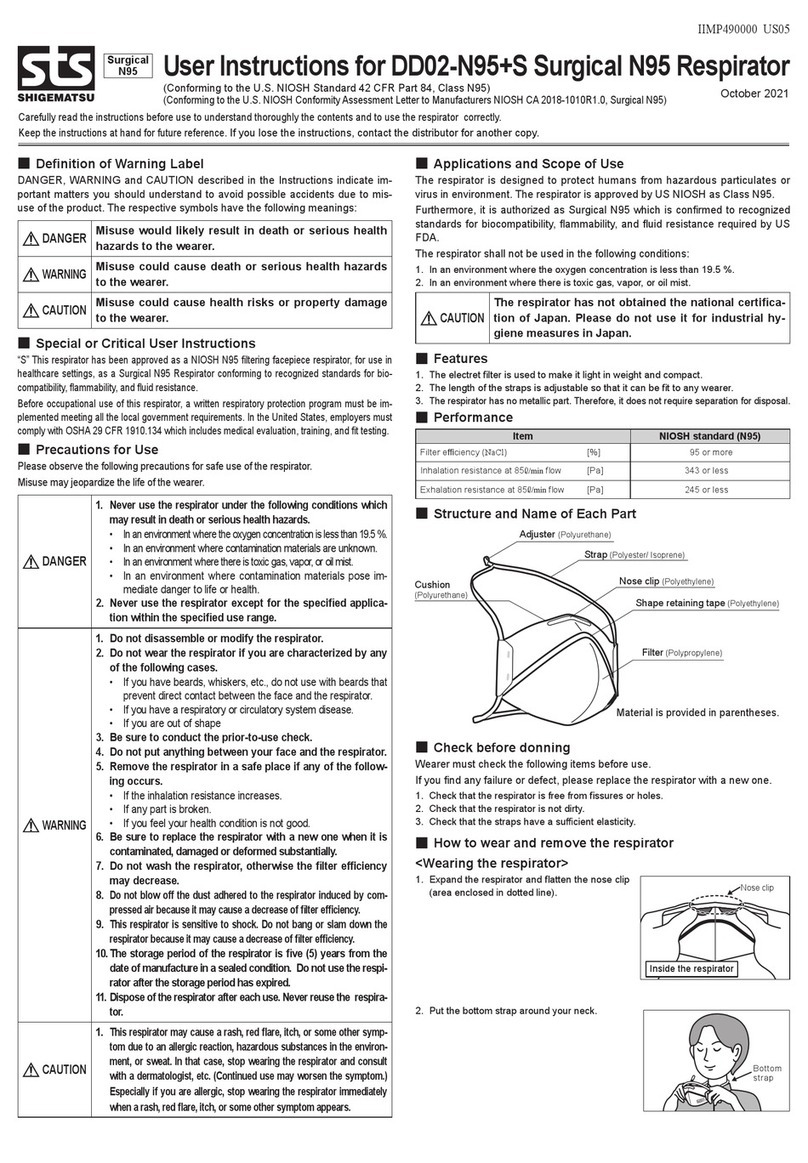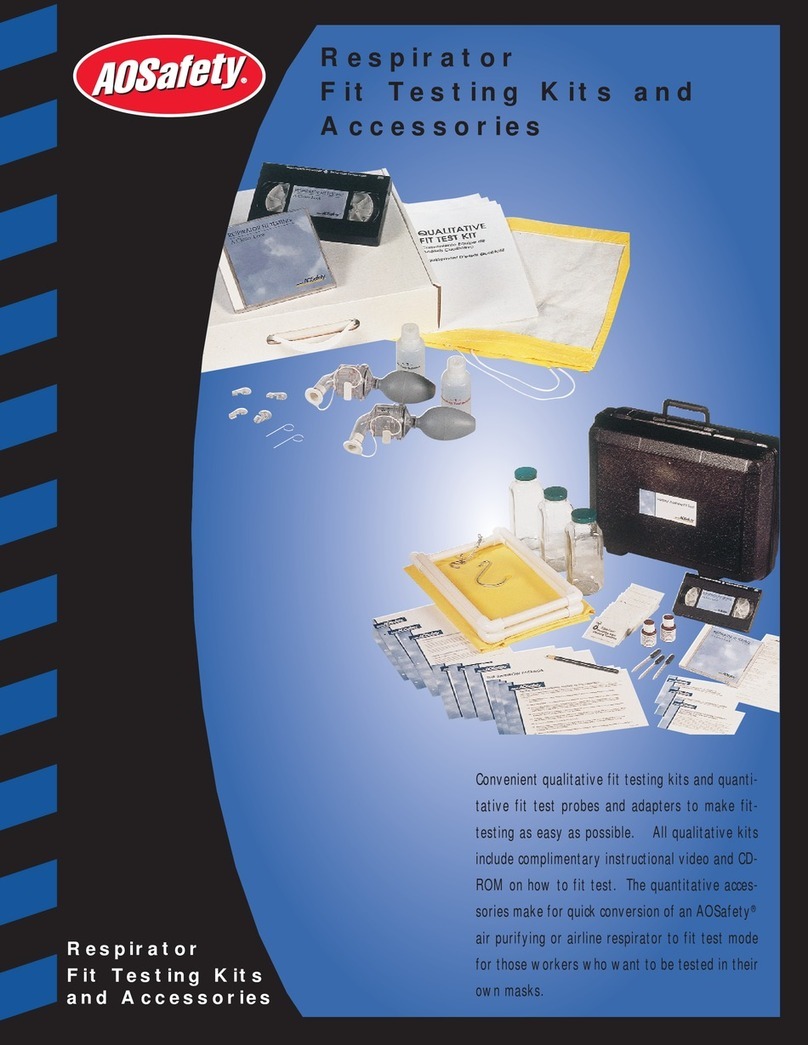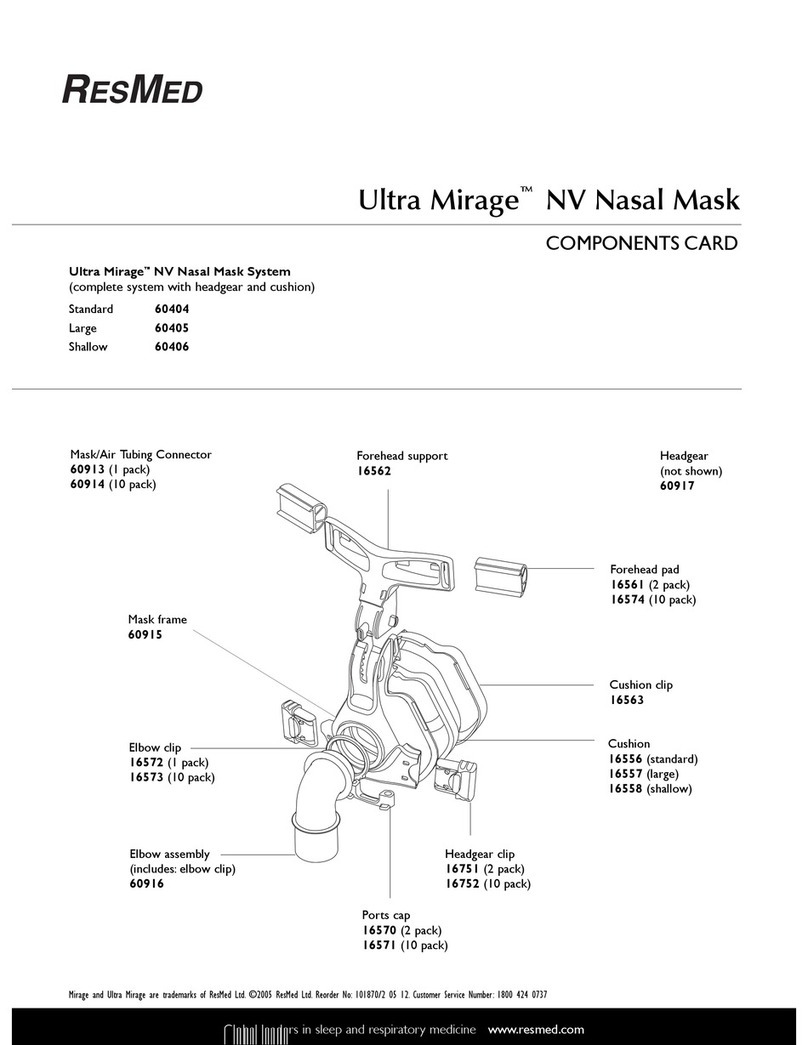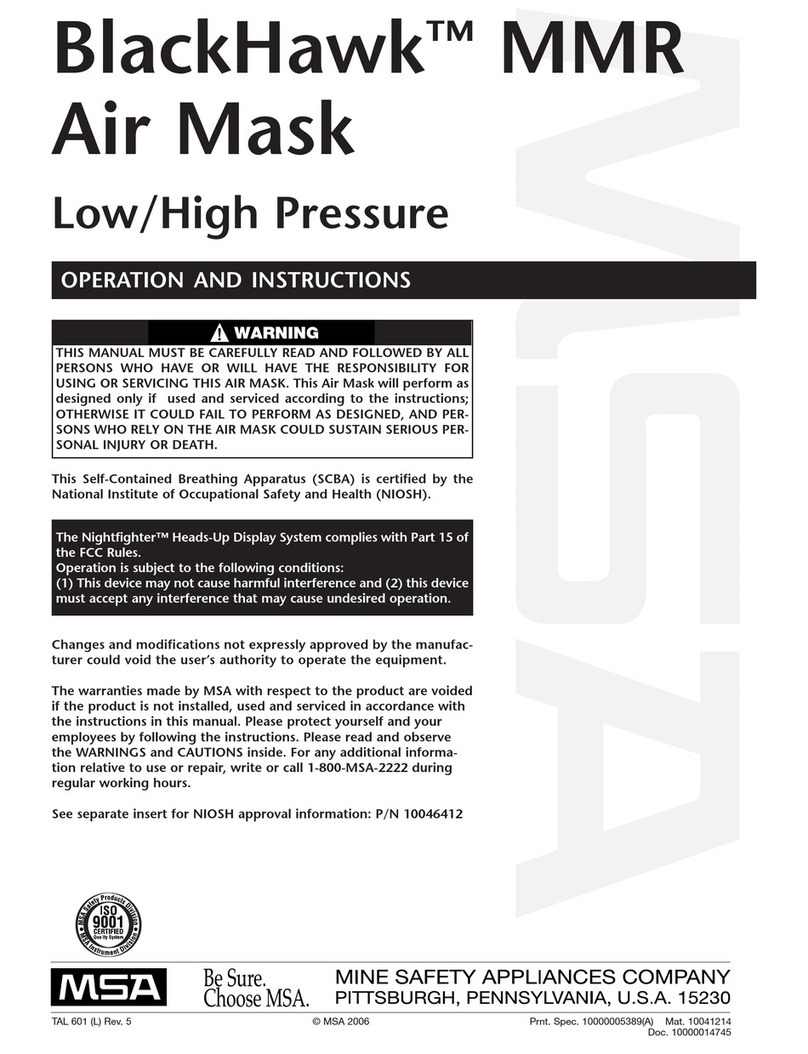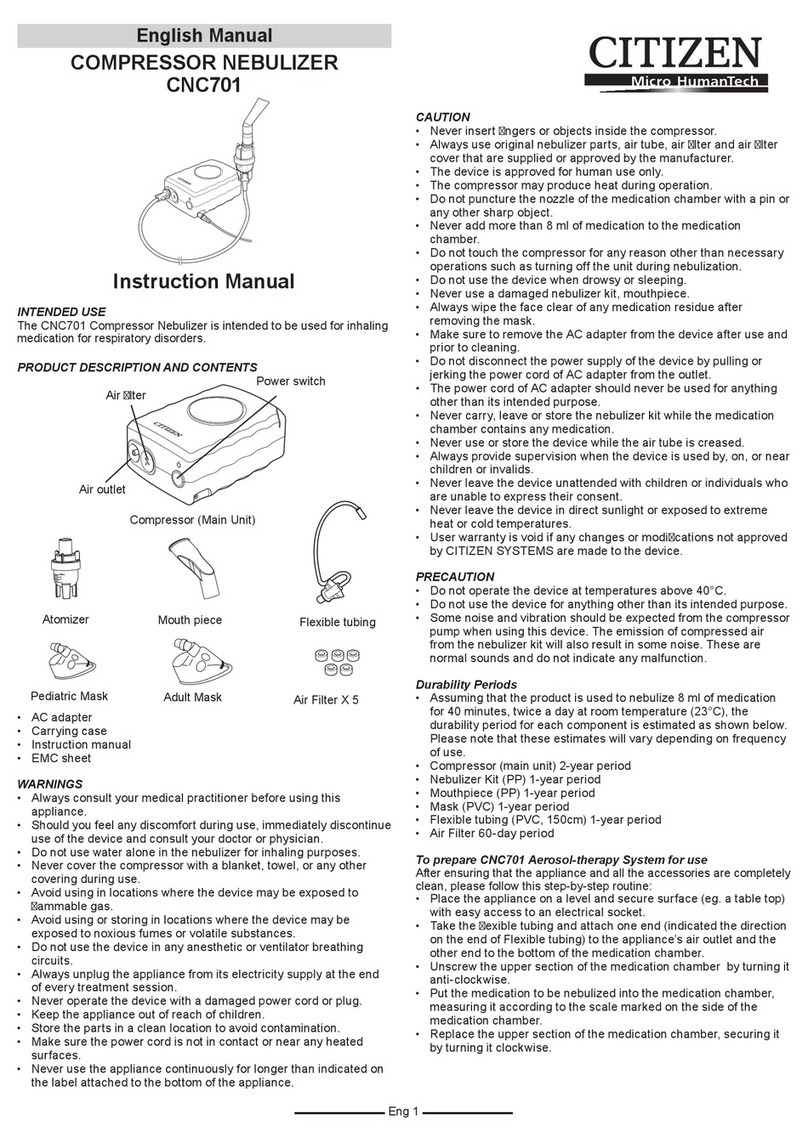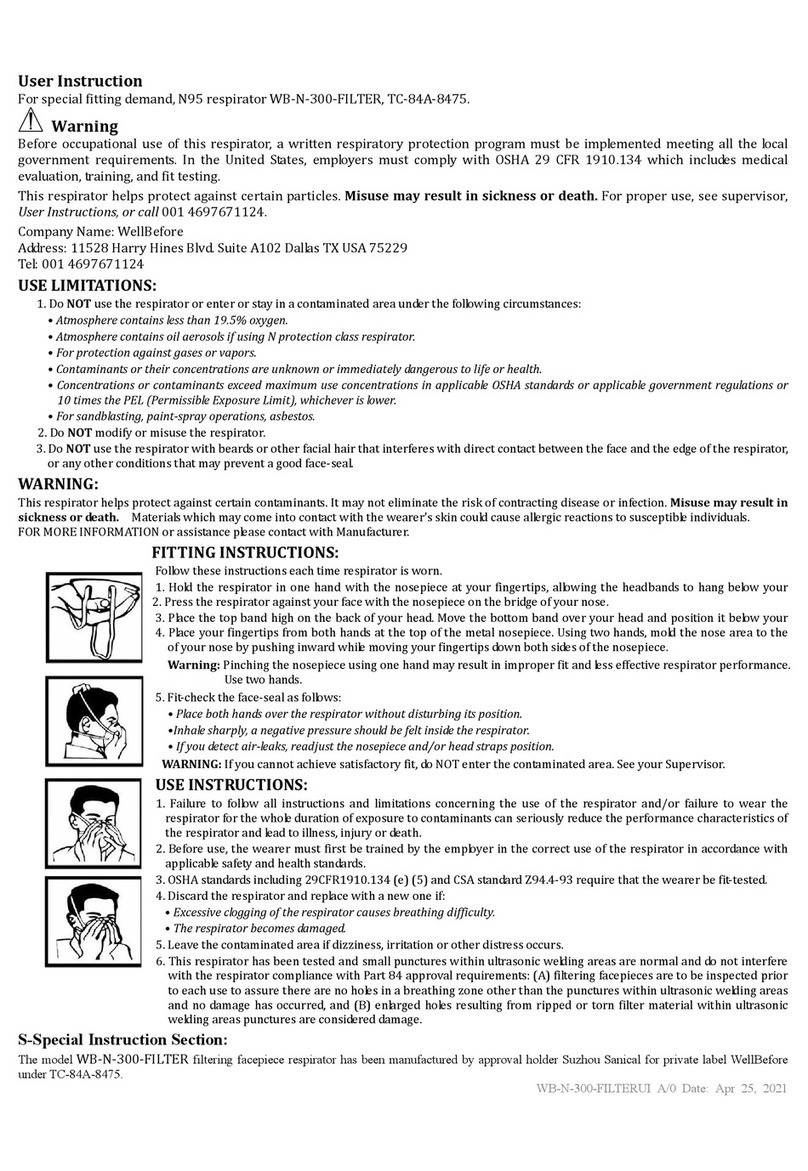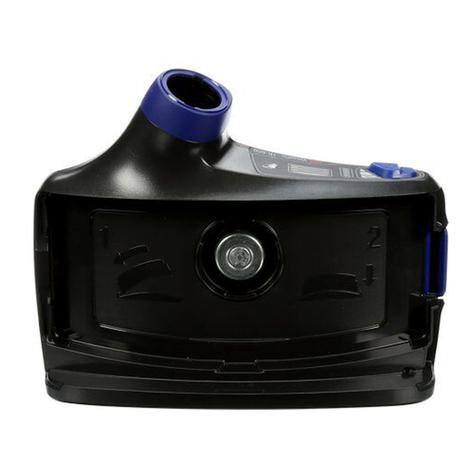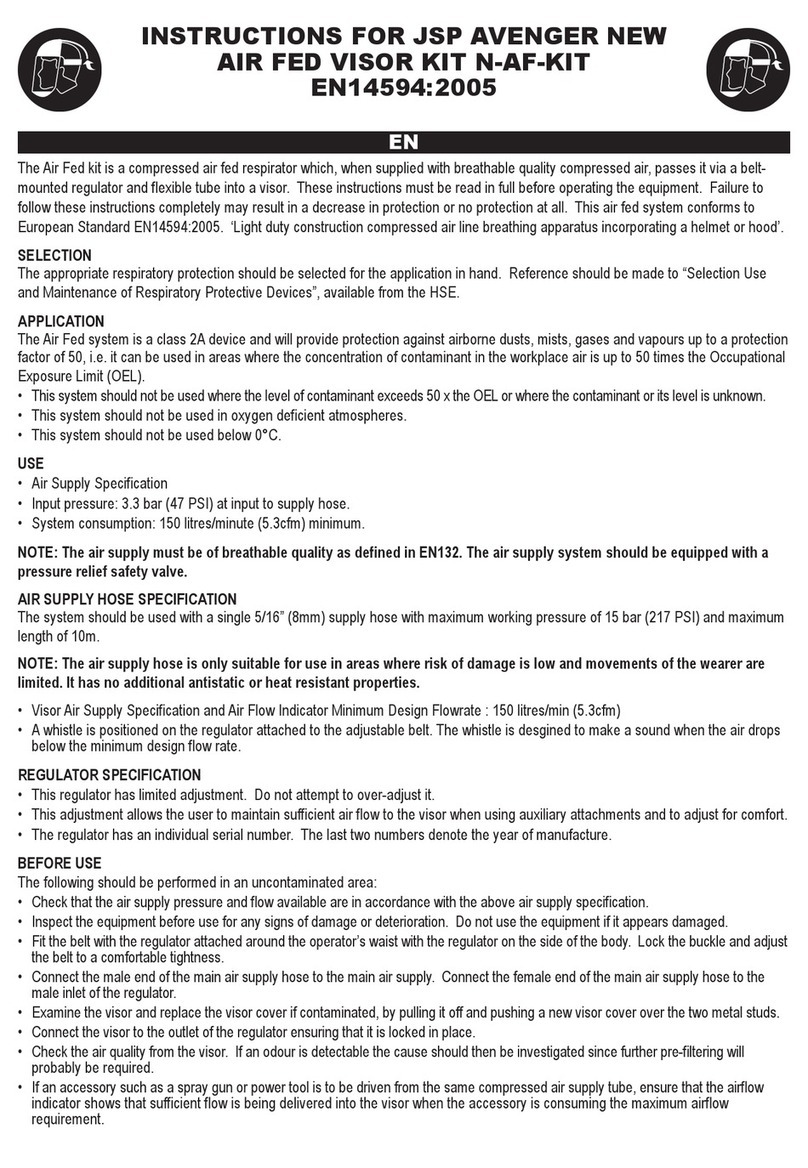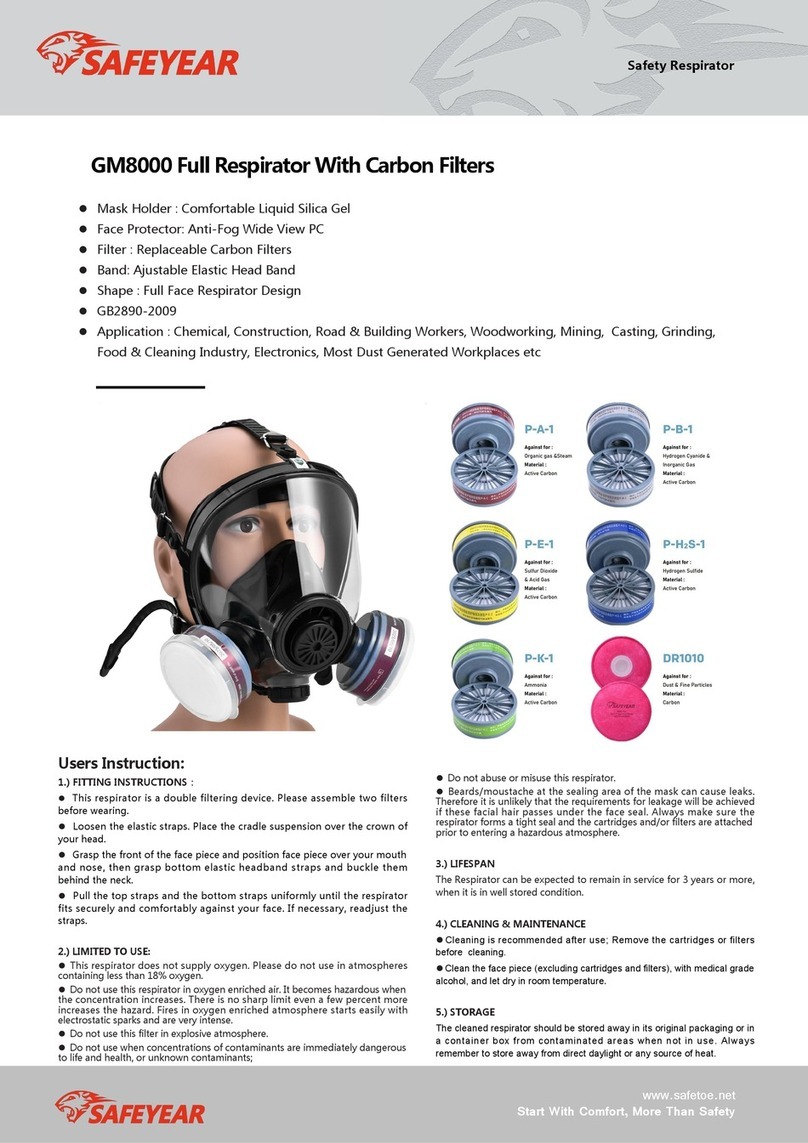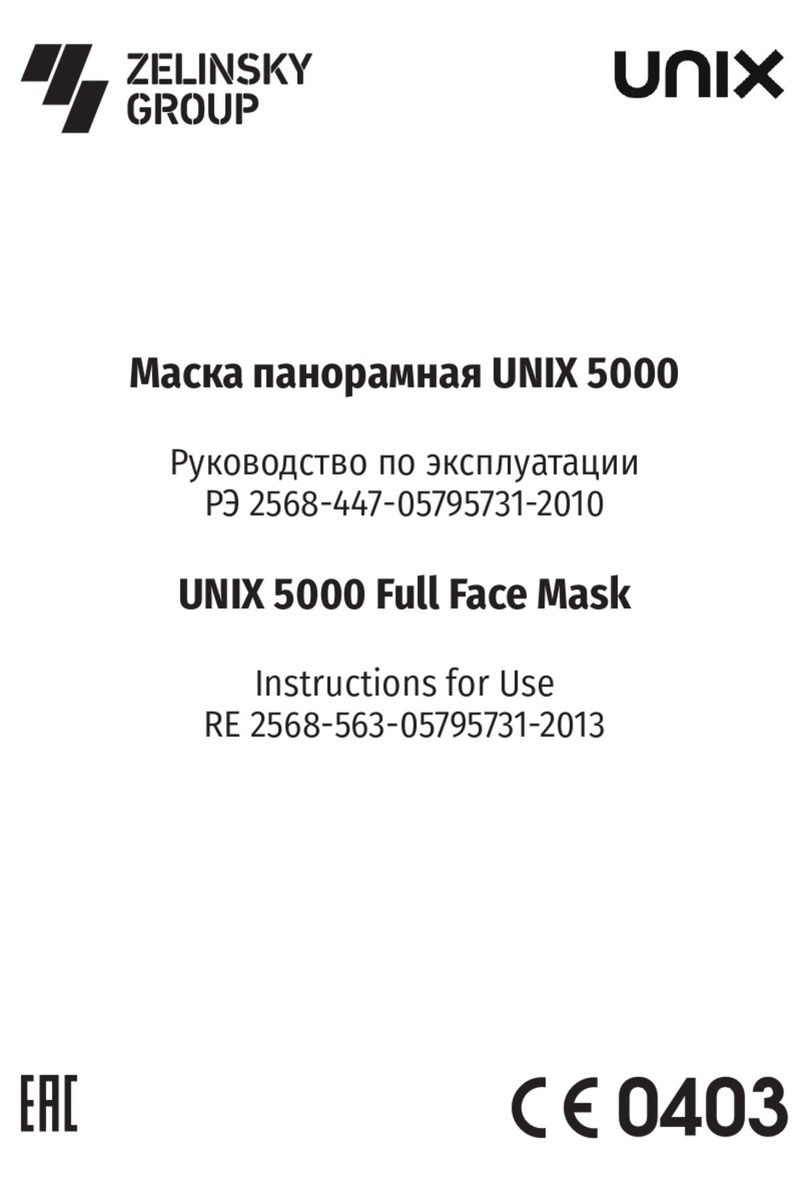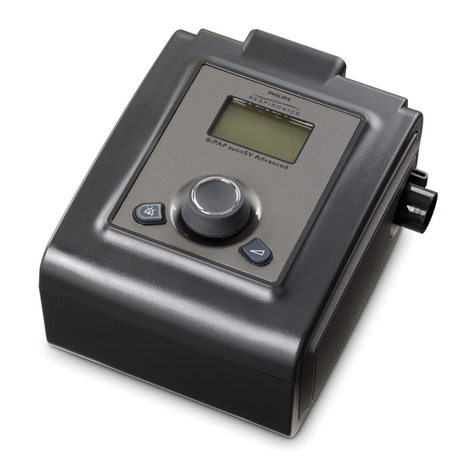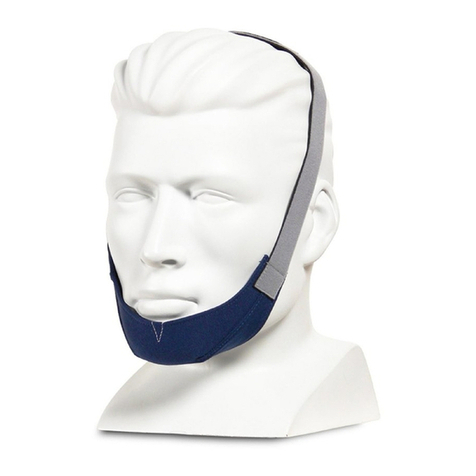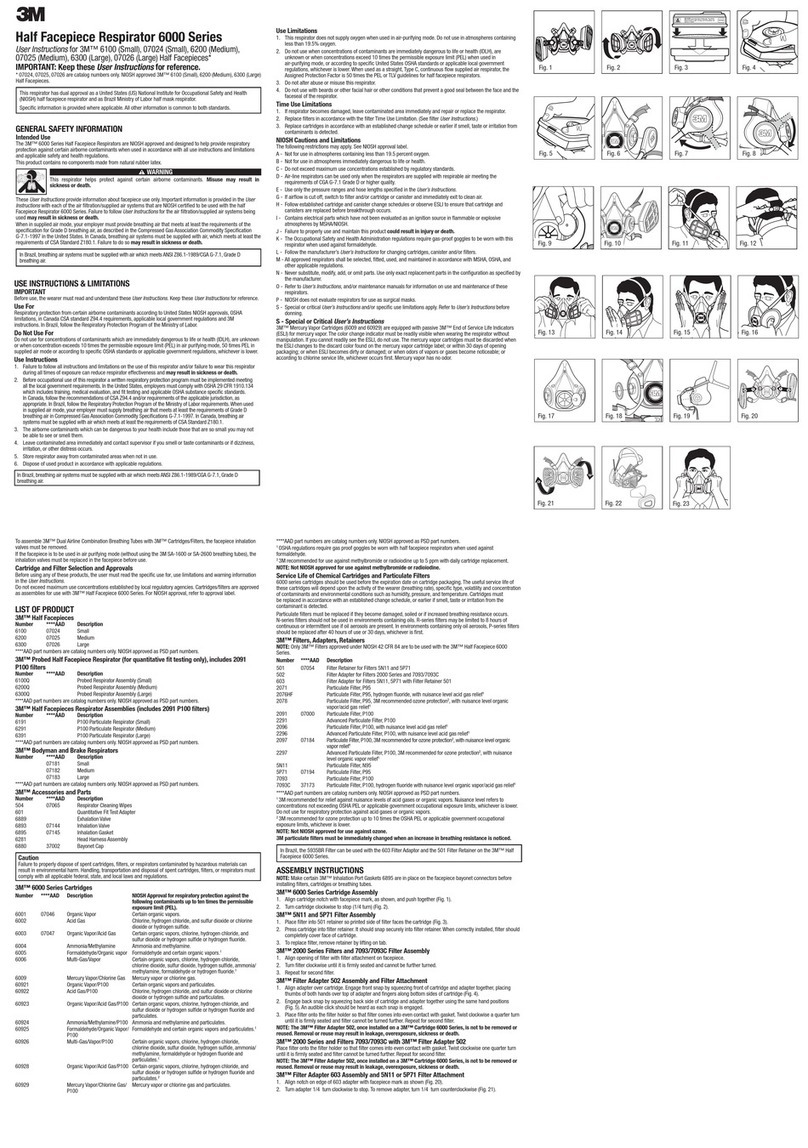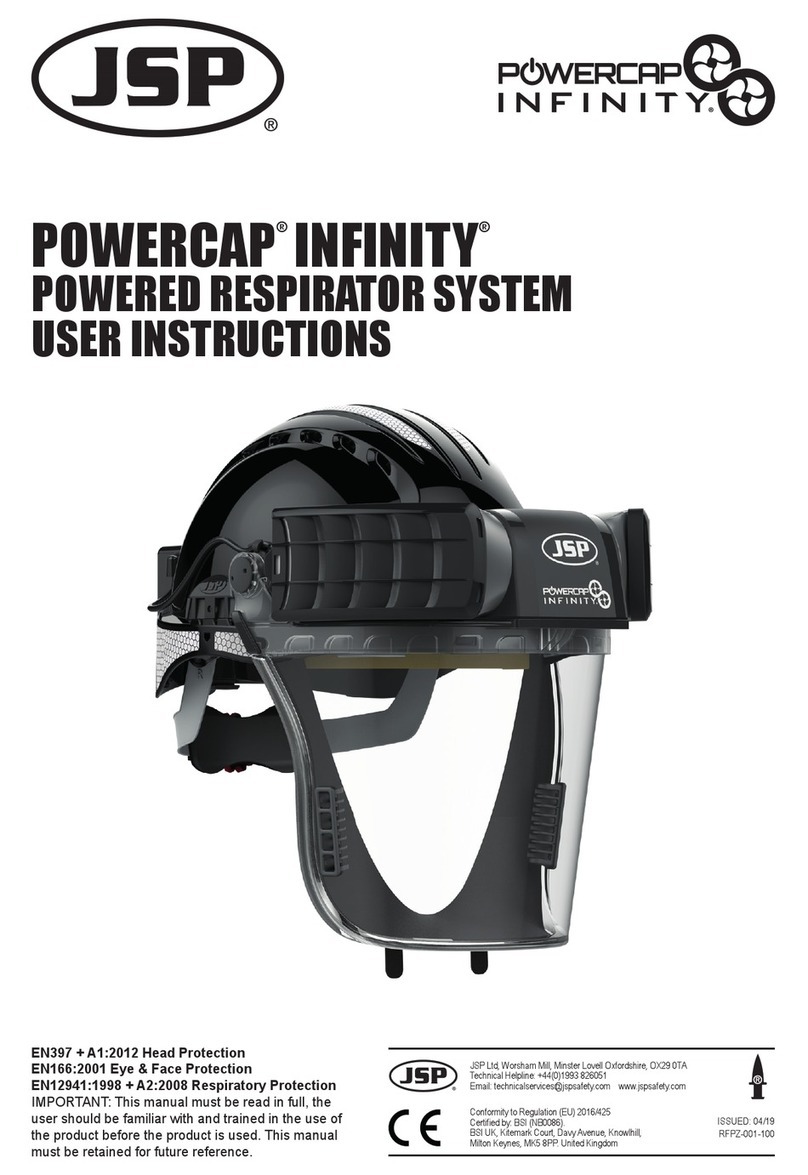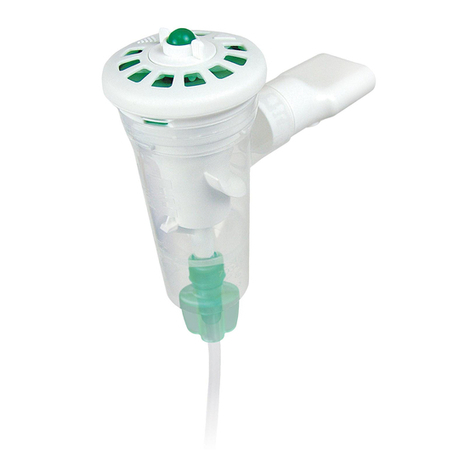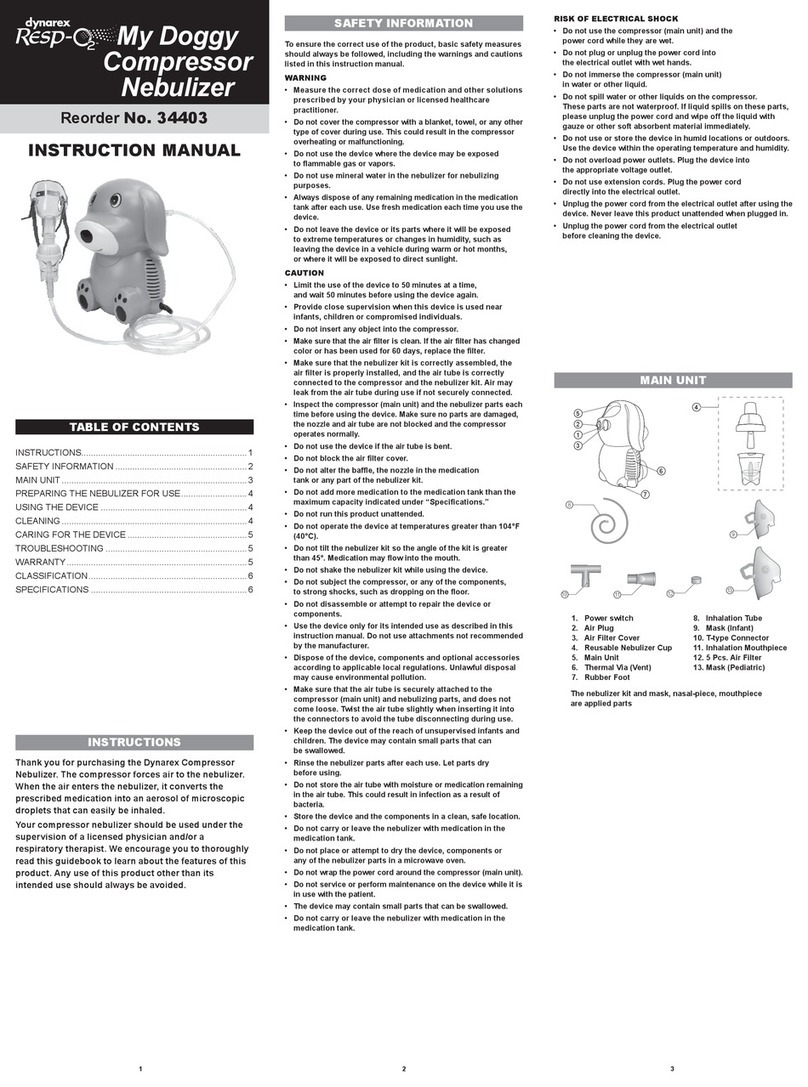STS DD11-N95-5 Installation instructions

User Instructions for DD11-N95-5 particulate respirator
October 2021
IIMP790000 US01
Carefully read the instructions before use to understand thoroughly the contents and to use the respirator correctly.
Keep the instructions at hand for future reference.
If you lose the instructions, contact the distributor for another copy.
■Denition of Warning Label
DANGER, WARNING and CAUTION described in the Instructions indicate im-
portant matters you should understand to avoid possible accidents due to mis-
use of the product. The respective symbols have the following meanings:
DANGER
Misuse would likely result in death or serious health
hazards to the wearer.
WARNING
Misuse could cause death or serious health hazards
to the wearer.
CAUTION
Misuse could cause health risks or property damage
to the wearer.
■Precautions for Use
Before occupational use of this respirator, a written respiratory protection pro-
gram must be implemented meeting all the local government requirements. In
the United States, employers must comply with OSHA 29 CFR 1910.134 which
includes medical evaluation, training, and t testing.
Please observe the following precautions for safe use of the respirator.
Misuse may jeopardize the life of the wearer.
DANGER
1. Never use the respirator under the following conditions which may
result in death or serious health hazards.
• In an environment where the oxygen concentration is less than 19.5 %.
• In an environment where contamination materials are unknown.
• In an environment where there is toxic gas, vapor, or oil mist.
• In an environment where contamination materials pose immediate
danger to life or health.
2. Never use the respirator except for the specied application
within the specied use range.
WARNING
1. Do not disassemble or modify the respirator.
2. Do not wear the respirator if you are characterized by any of
the following cases.
• If you have beards, whiskers, etc., do not use with beards that pre-
vent direct contact between the face and the respirator.
• If you have a respiratory or circulatory system disease.
• If you are out of shape
3. Be sure to conduct the prior-to-use check.
4. Do not put anything between your face and the respirator.
5. Remove the respirator in a safe place if any of the following occurs.
• If the inhalation resistance increases.
• If any part is broken.
• If you feel your health condition is not good.
6. Be sure to replace the respirator with a new one when it is con-
taminated, damaged or deformed substantially.
7. Do not wash the respirator, otherwise the lter efciency may
decrease.
8. Do not blow off the dust adhered to the respirator induced by
compressed air because it may cause a decrease of lter ef-
ciency.
9. This respirator is sensitive to shock. Do not bang or slam down
the respirator because it may cause a decrease of lter efciency.
10. The storage period of the respirator is two (2) years from the date of
manufacture in a sealed condition. Do not use the respirator after
the storage period has expired.
11. Dispose of the respirator after each use. Never reuse the respirator.
CAUTION
1. This respirator may cause a rash, red are, itch, or some other
symptom due to an allergic reaction, hazardous substances in
the environment, or sweat. In that case, stop wearing the respira-
tor and consult with a dermatologist, etc. (Continued use may
worsen the symptom.) Especially if you are allergic, stop wearing
the respirator immediately when a rash, red are, itch, or some
other symptom appears.
■Applications and Scope of Use
The respirator is designed to protect humans from hazardous particulates in
environment. The respirator is approved by US NIOSH as Class N95. It also
conforms to the “Guidelines for prevention of tuberculosis infection in medical
facilities” set by the CDC (Centers for Disease Control and Prevention).
The respirator shall not be used in the following conditions:
1. In an environment where the oxygen concentration is less than 19.5 %.
2. In an environment where there is toxic gas, vapor, or oil mist.
CAUTION
The respirator has not obtained the national certica-
tion of Japan. Please do not use it for industrial hy-
giene measures in Japan.
■Features
1. The respirator is made of electret lter media and is easy to use.
2. Polyester jersey of the face seal cloth has improved wearing comfort.
3. The length of the straps is adjustable so that it can be t to any wearer.
4. The respirator has no metallic part. Therefore, it does not require separation for dis-
posal.
■Performance
Item NIOSH standard (N95)
Filter efciency (NaCl) [%] 95 or more
Inhalation resistance at 85 ow [Pa] 105 or less
Exhalation resistance at 85 ow [Pa] 105 or less
■Structure and Name of Each Part
Upper strap
Buckle
Exterior View
Filter media
Interior ViewSide View
Inner frame
Face seal cloth
Approval label
Lower strap
■Check before donning
Wearer must check the following items before use.
If you nd any failure or defect, please replace the respirator with a new one.
1. Check that the respirator is free from ssures or holes.
2. Check that the respirator is not dirty.
3. Check that the straps have a sufcient elasticity.
■How to wear and remove the respirator
<Wearing the respirator>
Lower
strap
Buckle
Approval
label
1. Correctly position the respirator’s top and bottom so as to set the approval lavel
downward. Then stretch out the lower strap with both hands and place it around the
back of your neck.
2. Holding the respirator with one hand at the nose and mouth, place the upper strap
around your head using the other hand.
3. If the tness of the face and the mask is loose, adjust the strap length by pulling on
the ends of the strap.
N95
(Conforming to the U.S. NIOSH Standard 42 CFR Part 84, Class N95)

<Removing the respirator>
After removing the top strap over the back of your head, remove the bottom
strap hanging around your neck.
CAUTION
In order to prevent the secondary infection, special
care must be taken not to touch the surface of the res-
pirator when taking off the respirator.
■Proper tting
In order to achieve the original performance of the respirator, the respirator must
have best t. The user is required to be t tested according to OSHA 29 CFR
1910.134 either qualitatively or quantitatively prior to use. Conduct a t check
following this procedure every time you put on the respirator.
1. Wear the respirator in the same manner as you
actually conduct during work.
2. Cover the respirator with two hands and exhale.
If it is not possible to cover the respirator with
both hands, use a polyethylene sheet to cover
the surface of the respirator, holding it down
with both hands and exhale.
3. Check that no air leaks through respirator-to-face
seal when you exhale. If you feel air leakage,
adjust the position of respirator and/or tention of
straps until the air leakage stops.
WARNING
1. Before using the respirator in an actual operation, be sure to con-
duct the inspection whether the respirator is properly tted or not.
2. If it is not possible to ascertain that the respirator is properly tted,
do not use the respirator in an actual operation. Make the neces-
sary adjustments so that the respirator rmly ts your face.
If it is still not possible to ascertain that the respirator
is attached properly after those adjustments, inspect
each and every portion of the respirator at a safe
place.
(Please refer to “Check before donning”.)
■Storage Method
Store the respirator in a clean, cool, dark and dry place.
CAUTION
Do not pile up or bend the respirators to store ; it may
cause problems such as ssures, deformation, etc.
■Disposal Method
Put the used respirator in an airtight bag to prevent the particulate matters from
scattering before disposal in accordance with the applicable laws and regula-
tions.
■NIOSH Approval Label
1-26-1, Nishigahara, Kita-ku, Tokyo
114-0024, JAPAN
+81-3-6903-7525
THIS RESPIRATOR IS APPROVED ONLY IN THE FOLLOWING CONFIGURATION:
TC- Protection1Respirator Cautions and Limitations2
DD11-N95-5
84A-9401 N95 X ABCJMNOP
1. Protection
N95-Particulate Filter(95% lter efciency level)
effective against particulate aerosols free of oil;
time use restrictions may apply.
2. Cautions and Limitations
A- Not for use in atmospheres containing less than 19.5 % oxygen.
B- Not for use in atmospheres immediately dangerous to life or health.
C- Do not exceed maximum use concentrations established by regulatory
standards.
J- Failure to properly use and maintain this product could result in injury or
death.
M- All approved respirators shall be selected, tted, used, and maintained in
accordance with MSHA, OSHA and other applicable regulations.
N- Never substitute, modify, add, or omit parts. Use only exact replacement
parts in the conguration as specied by the manufacturer.
O- RRefer to User’s Instructions, and/or maintenance manuals for information
on use and maintenance of these respirators.
P- NIOSH does not evaluate respirators for use as surgical masks.
For more information regarding the handling method of the
product, please contact:
Head Office
1-26-1, Nishigahara, Kita-ku, Tokyo 114-0024, Japan
Tel : +81-3-6903-7525
Other STS Respiratory Product manuals

